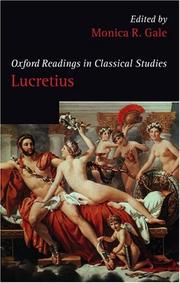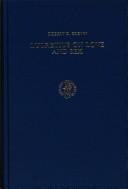| Listing 1 - 10 of 35 | << page >> |
Sort by
|
Book
ISBN: 3487094045 9783487094045 Year: 1991 Volume: 122 Publisher: Hildesheim Olms-Weidmann
Abstract | Keywords | Export | Availability | Bookmark
 Loading...
Loading...Choose an application
- Reference Manager
- EndNote
- RefWorks (Direct export to RefWorks)
Book

ISBN: 2757434225 2859390618 Year: 2021 Volume: v. 1 Publisher: Villeneuve d'Ascq : Presses universitaires du Septentrion,
Abstract | Keywords | Export | Availability | Bookmark
 Loading...
Loading...Choose an application
- Reference Manager
- EndNote
- RefWorks (Direct export to RefWorks)
Le Centre de Recherche Philologique de l’Université de Lille III publie ici, dans un premier cahier, quelques etudes consacrées a l’histoire de l’epicurisme, qui est l’objet d’une de ses activités principales. Les travaux de ses membres ont en commun d’insister sur l’examen approfondi de la lettre du texte, où nous voyons la condition d’un renouvellement de la compréhension. La critique de la tradition interprétative fait partie de ce reexamen, dont le lieu privilégié se trouve dans des textes, qui, se situant eux-mêmes dans une continuité remarquable, comme le poeme de Lucrèce et le mur d ’Oenoanda, imposent une réflexion sur les modes de l’actualisation dans le cadre d’une orthodoxie essentielle. Nous sommes heureux de publier en meme temps les travaux d’hotes du Centre, et en particulier les demieres découvertes de Martin F. Smith a Oenoanda, qui manquent une nouvelle etape de la connaissance de l’inscription de Diogene. David Sedley, qui a présenté a Lille, dans une sérié de séminaires, les problèmes poses par l ’interpretation des papyrus du Péri Phuseôs d’Épicure, reprend ici l’analyse de quelques parties de la Vie de Diogene Laerce, complétant heureusement le commentaire de ce texte par André Laks. P.H. Schrijvers explique, a propos d’un chapitre de la physiologie, de quelle manière doit être reprise, selon lui. la question des « sources » de Lucrèce, considérées comme le materiel d’une culture scientifique globale. Diskin Oay, qui entretient avec le Centre des relations suivies et déjà anciennes, communique, sur ce sujet, les éléments d’une réflexion de portée générale.
Philosophy --- philologie --- philosophie --- Antiquité --- épicurisme --- Epicurus --- Lucretius Carus, Titus --- Diogenes, --- Philosophy, Ancient --- Epicurus. --- Lucretius Carus, Titus.
Book
ISBN: 9026307047 9026307055 Year: 1984 Publisher: Baarn Ambo
Abstract | Keywords | Export | Availability | Bookmark
 Loading...
Loading...Choose an application
- Reference Manager
- EndNote
- RefWorks (Direct export to RefWorks)
Classical Latin literature --- filosofie --- Lucretius Carus, Titus --- Philosophy of nature
Book
ISBN: 0906795060 Year: 1985 Volume: vol no. 13
Abstract | Keywords | Export | Availability | Bookmark
 Loading...
Loading...Choose an application
- Reference Manager
- EndNote
- RefWorks (Direct export to RefWorks)
094 LUCRETIUS CARUS, TITUS --- Oude en merkwaardige drukken. Kostbare en zeldzame boeken. Preciosa en rariora--LUCRETIUS CARUS, TITUS --- 094 LUCRETIUS CARUS, TITUS Oude en merkwaardige drukken. Kostbare en zeldzame boeken. Preciosa en rariora--LUCRETIUS CARUS, TITUS --- Lucrèce. Bibliographie. --- Lucretius. Bibliografie.

ISBN: 1281164208 0191531987 1435614070 9780191531989 9781435614079 9786611164201 6611164200 0199260354 0199260346 9780199260355 9780199260348 Year: 2007 Publisher: Oxford New York Oxford University Press
Abstract | Keywords | Export | Availability | Bookmark
 Loading...
Loading...Choose an application
- Reference Manager
- EndNote
- RefWorks (Direct export to RefWorks)
A collection of important scholarly articles on the Roman poet Lucretius, whose philosophical epic, the De Rerum Natura or On the Nature of the Universe (c.55 BC), seeks to convince its readers of the validity of the rationalist theories of Epicurus. An Introduction contextualizes the essays, and all Greek and Latin is translated. - ;This book gathers together some of the most important and influential scholarly articles of the last sixty to seventy years (three of which are translated into English here for the first time) on the Roman poet Lucretius. Lucretius' philosophical epic, the De Reru
Book
ISBN: 0674967089 0674736052 9780674736054 9780674725577 0674725573 9780674967083 Year: 2014 Publisher: Cambridge, MA
Abstract | Keywords | Export | Availability | Bookmark
 Loading...
Loading...Choose an application
- Reference Manager
- EndNote
- RefWorks (Direct export to RefWorks)
After its rediscovery in 1417, Lucretius's Epicurean didactic poem De Rerum Natura threatened to supply radicals and atheists with the one weapon unbelief had lacked in the Middle Ages: good answers. Scholars could now challenge Christian patterns of thought by employing the theory of atomistic physics, a sophisticated system that explained natural phenomena without appeal to divine participation, and argued powerfully against the immortality of the soul, the afterlife, and a creator God. Ada Palmer explores how Renaissance readers, such as Machiavelli, Pomponio Leto, and Montaigne, actually ingested and disseminated Lucretius, and the ways in which this process of reading transformed modern thought. She uncovers humanist methods for reconciling Christian and pagan philosophy, and shows how ideas of emergent order and natural selection, so critical to our current thinking, became embedded in Europe's intellectual landscape before the seventeenth century. This heterodoxy circulated in the premodern world, not on the conspicuous stage of heresy trials and public debates, but in the classrooms, libraries, studies, and bookshops where quiet scholars met the ideas that would soon transform the world. Renaissance readers-poets and philologists rather than scientists-were moved by their love of classical literature to rescue Lucretius and his atomism, thereby injecting his theories back into scientific discourse. Palmer employs a new quantitative method for analyzing marginalia in manuscripts and printed books, exposing how changes in scholarly reading practices over the course of the sixteenth century gradually expanded Europe's receptivity to radical science, setting the stage for the scientific revolution.
HISTORY / Renaissance. --- Lucretius Carus, Titus. --- Lucrèce, 98-55 av JC
Book
ISBN: 1474434681 147443469X 9781474434683 1474434673 9781474434676 9781474434669 1474434665 Year: 2022 Publisher: Edinburgh
Abstract | Keywords | Export | Availability | Bookmark
 Loading...
Loading...Choose an application
- Reference Manager
- EndNote
- RefWorks (Direct export to RefWorks)
The most original and shocking interpretation of Lucretius in the last 40 yearsA new materialist, quantum and feminist interpretation of LucretiusArgues the original and provocative thesis that Lucretius was not an atomist but rather the first philosopher of motionThe most profound revision of how we read Lucretius since Michel Serres’ The Birth of Physics (1977)Luretius II launch offerFind out where it all started: we're offering a free ebook of Lucretius I when you buy a copy of Lucretius II. Just add a copy of Lucretius II (paperback, hardback or ebook) and a Lucretius I ebook to your basket, and enter the code Lucretius2 when you check out.Visit the webpage for Lucretius IIThomas Nail argues convincingly and systematically that Lucretius was not an atomist, but a thinker of kinetic flux. In doing so, he completely overthrows the interpretive foundations of modern scientific materialism, whose philosophical origins lie in the atomic reading of Lucretius’ immensely influential book De Rerum Natura.This means that Lucretius was not the revolutionary harbinger of modern science as Greenblatt and others have argued; he was its greatest victim. Nail re-reads De Rerum Natura to offer us a new Lucretius – a Lucretius for today."
Lucretius Carus, Titus. --- De rerum natura (Lucretius Carus, Titus) --- T. Lucreti Cari De rerum natura libri sex (Lucretius Carus, Titus) --- Titi Lucretii Cari poetae ac philosophi vetustiss. De rerum natura libri sex (Lucretius Carus, Titus) --- Titi Lucretij Cari poetae ac philosophi uetustiss. De rerum natura libri sex (Lucretius Carus, Titus) --- Titi Lucretii Cari De rerum natura libri sex (Lucretius Carus, Titus) --- HISTORY / Ancient / Rome. --- Ontologie. --- Lucretius Carus, Titus,
Book
ISBN: 9789023465430 9023465431 Year: 2012 Publisher: Amsterdam : De Bezige Bij,
Abstract | Keywords | Export | Availability | Bookmark
 Loading...
Loading...Choose an application
- Reference Manager
- EndNote
- RefWorks (Direct export to RefWorks)
Studie over de herontdekking van het dichtwerk van de Romeinse dichter Lucretius (1ste eeuw v. Chr.) over 'de natuur der dingen' in de 15de eeuw en de invloed die dit werk had op het menselijke denken.
History of civilization --- Lucretius Carus, Titus --- anno 1400-1499 --- anno 1500-1599 --- Lucretius Carus, T.,
Book
ISBN: 1107439949 1107424607 1107422582 1107418178 1107419476 1107416833 1107420660 1139775405 9781107416833 9781139775403 9781107037458 110703745X 110873023X 9781107439948 9781107424609 9781107422582 9781107418172 9781107419476 9781107420663 Year: 2013 Publisher: Cambridge
Abstract | Keywords | Export | Availability | Bookmark
 Loading...
Loading...Choose an application
- Reference Manager
- EndNote
- RefWorks (Direct export to RefWorks)
This is the first detailed analysis of the fate of Lucretius' De rerum natura from its composition in the 50s BC to the creation of our earliest extant manuscripts during the Carolingian Age. Close investigation of the knowledge of Lucretius' poem among writers throughout the Roman and medieval world allows fresh insight into the work's readership and reception, and a clear assessment of the indirect tradition's value for editing the poem. The first extended analysis of the 170+ subject headings (capitula) that intersperse the text reveals the close engagement of its Roman readers. A fresh inspection and assignation of marginal hands in the poem's most important manuscript (the Oblongus) provides new evidence about the work of Carolingian correctors and offers the basis for a new Lucretian stemma codicum. Further clarification of the interrelationship of Lucretius' Renaissance manuscripts gives additional evidence of the poem's reception and circulation in fifteenth-century Italy.
Didactic poetry, Latin --- History and criticism. --- Lucretius Carus, Titus. --- Arts and Humanities --- History

ISBN: 9004085122 9789004085121 Year: 1987 Volume: 15 Publisher: Leiden ; New York, NY ; København [etc.] : E.J. Brill,
Abstract | Keywords | Export | Availability | Bookmark
 Loading...
Loading...Choose an application
- Reference Manager
- EndNote
- RefWorks (Direct export to RefWorks)
Lucretius Carus, Titus --- Love in literature --- Sex in literature --- 871 LUCRETIUS CARUS, TITUS --- Latijnse literatuur--LUCRETIUS CARUS, TITUS --- Lukrecjusz Karus, Tytus --- Lukret︠s︡iĭ Kar, Tit --- Lucrezio, Tito --- Lucrèce --- Lucrez --- Lucrecio Caro, T. --- Caro, T. Lucrecio --- Carus, Titus Lucretius --- Lucretius --- Lucrezio Caro, Tito --- Lucrecio --- Lucreti Cari, T. --- Lucreci --- לוקרציוס קרוס, טיטוס --- Love in literature. --- Sex in literature. --- Lucretius Carus, Titus. --- 871 LUCRETIUS CARUS, TITUS Latijnse literatuur--LUCRETIUS CARUS, TITUS --- Lucrèce --- Lukrez --- Lucretius / en liefde. --- Lucretius / en sekse. --- Lucrèce. De natura rerum. --- Lucrèce / et amour. --- Lucrèce / et sexe. --- Lucretius. De natura rerum. --- Lucretius Carus, Titus - De rerum natura - Liber 4
| Listing 1 - 10 of 35 | << page >> |
Sort by
|

 Search
Search Feedback
Feedback About UniCat
About UniCat  Help
Help News
News